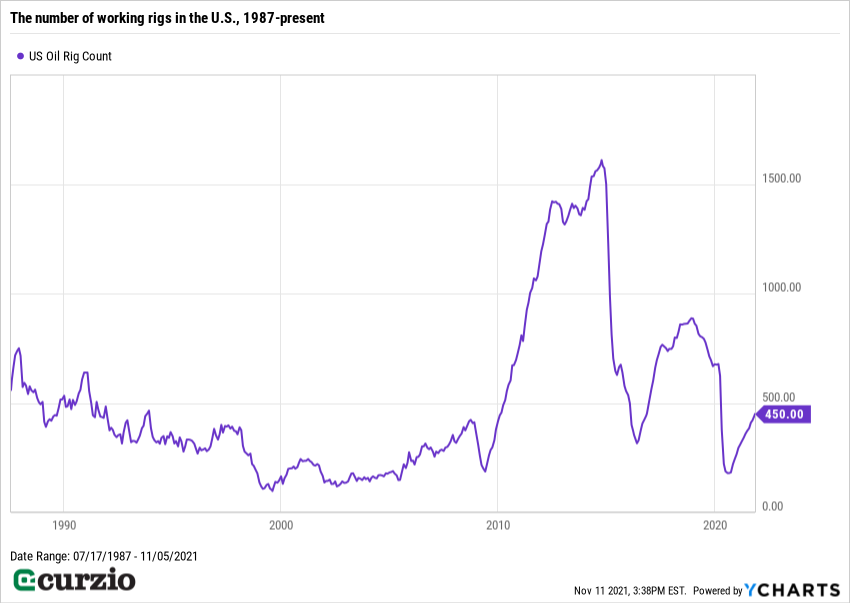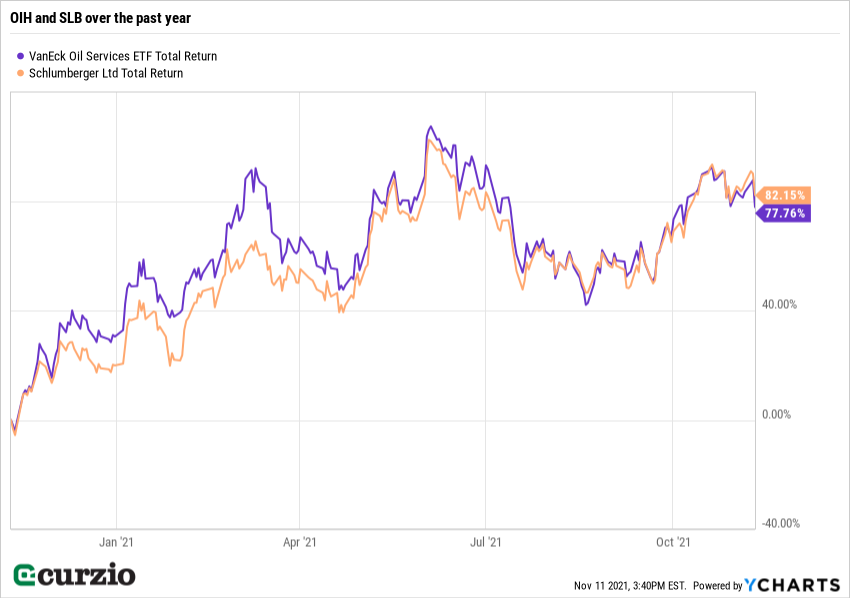You might have heard the phrase, “The cure for low oil prices is low oil prices.”
It reflects the universal law of supply and demand… the many uses for fossil fuels… and the dearth of oil substitutes in many essential industries—from transportation to chemicals.
The lower oil prices are, the less incentive producers have to grow or even maintain output—just when demand is growing. And this dynamic carries the seed of higher prices.
It may take several years for the cycle to work itself out, but so far, oil has always come back with a vengeance.
In April 2020, oil was going for $17 a barrel—the victim of a rare combination of widely excessive supply and contracting demand. Producers were essentially paying buyers to take oil off their hands.
Today, the price of oil has doubled from a year ago… and nearly tripled off the 2016 lows ($29 per barrel).
For oil, booms and busts come with the territory.
We’re now in the boom stage… as energy demand, prices, and stocks have seen an incredible recovery off their 2020 lows.
Below, I’ll detail why this is happening… and give you two easy ways to profit from the current stage of the energy cycle.
The main reason for the energy sector’s wide swings is that it takes a lot of time and money to find new resources… and it takes even more to actually begin production in new projects.
When oil prices are high, it means more profits… more capital companies can spend on new projects… and more desire to spend it.
As a result, we see a lot of supply hit the market—which then puts downward pressure on prices… just as high prices begin to translate into less demand.
This is why it’s also true that “the cure for high oil prices is high oil prices.”
As supply outpaces demand, energy prices eventually collapse… new projects go unfunded… and new supply stops coming on the market.
And low prices, meanwhile, create their own demand…
Eventually, as demand once again starts outpacing supply, the industry is often caught unprepared, with no new projects and limited spare capacity. That pushes prices higher… increasing capital investment and preparing the stage for higher production…
And the cycle begins again… each time in a slightly different way.
The bust of 2020 hit energy producers especially hard…
Several—especially in the hydraulic fracturing (fracking) side of the business—even ended up in bankruptcy.
That’s because, as fracking flooded the markets with cheap oil and gas, the business model became unsustainable due to lower prices.
The boom/bust dynamics worked here, too… As oil prices declined and some businesses went bankrupt, spending on new projects and new drilling went down… setting up the necessary conditions for future price increases.
Of course, the impact of green energies (like solar and wind) on oil prices shouldn’t be ignored.
In the past two decades, alternative energy has become cheaper and more efficient… outpacing growth in crude production by some 50% since 2000. The green energy space will get an additional boost from climate-change goals.
But fossil fuels are far from dead.
Oil, for instance, is still the No. 1 transportation fuel.
And, not to be overlooked, natural gas—crude oil’s closest relative—accounts for about a third of U.S. energy consumption… and for 40% of U.S.-produced electricity. Renewables still make up only half as much.
The COVID pandemic put another damper on oil demand.
It stopped most travel in its tracks… contributing to even greater excess oil supply—and record-low prices last year. As a result, 2020 saw a severe decline in the price of oil… and a sharp drop in the number of producing rigs.

But the post-pandemic recovery has been fast and furious… resulting in growing oil demand… and the doubling of oil and natural gas prices over the past year.
As the boom cycle starts again, more demand and higher prices will lead to more exploration and production… benefitting oil majors like Exxon (XOM) and Chevron (CVX).
But here’s another group of businesses that will benefit from the latest boom: service companies.
These companies provide necessary equipment and services supporting oil production—from reservoir research to well maintenance to engineering services to rigs.
This group is the most leveraged to the price of oil… which means it’s set to benefit most from higher prices.
You can invest in the group via an exchange-traded fund (ETF)… such as the VanEck Oil Services ETF (OIH), which owns 26 stocks in the business.
Or you can simply buy the leading company in the sector…
Schlumberger (SLB) dominates the industry… and accounts for more than 20% of the OIH (it’s the largest holding in the ETF). This is why the returns on both over the past year look so similar.

Schlumberger is my favorite oil company because the majority of oil-related businesses in the world need its services… one way or another.
According to The Guardian (2015), “It’s ubiquitous in fossil fuel operations across the world, has more staff than Google, turns over more than Boeing, and is worth more than McDonald’s.”
Much may have changed since 2015, but Schlumberger is still the biggest and the best in the business. And it has a lot of growth ahead of it… in this cycle and beyond.
Here are the main growth factors:
- Schlumberger helps at all stages of oil discovery and production… from seismic research to well construction to supply management.
- The company is also the leader in reservoir performance—it helps ensure maximum oil is recovered from existing reservoirs… a critical service in a world with fewer oil wells.
- It’s growing its green initiative. It’s developing a set of services and products to help reduce oilwell emissions and capture carbon… electrify the old-school oil and gas business… and produce hydrothermal energy.
And here’s the best part: After nearly doubling over the past year, the stock is still cheaper than the market. SLB trades at about 18.2x next year’s profits (versus the market’s 22.5x)… while its growth in the next year or two could easily exceed 30%.
Investing in commodities means being exposed to the risks of the busts… but it can also be rewarding in boom times. Both OIH and SLB are great ways to play the ongoing oil boom.




















